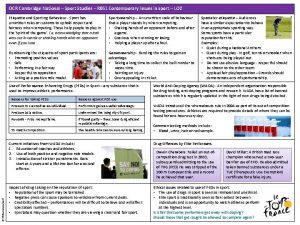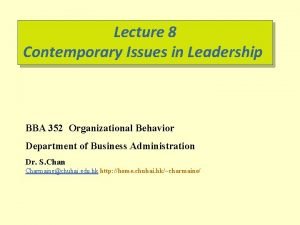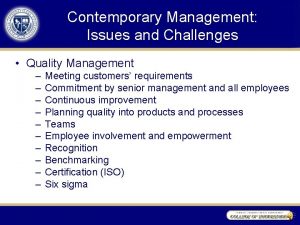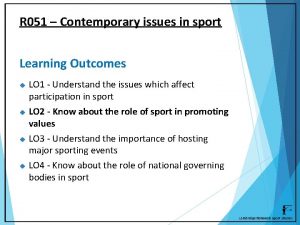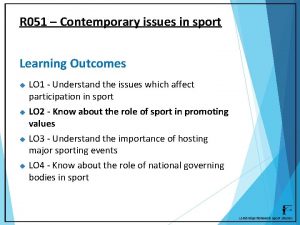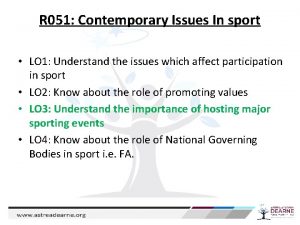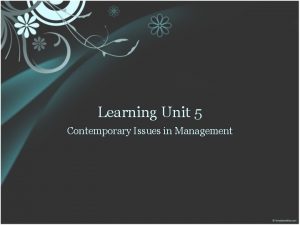R 051 Contemporary issues in sport Learning Outcomes















- Slides: 15

R 051 – Contemporary issues in sport Learning Outcomes LO 1 - Understand the issues which affect participation in sport LO 2 - Know about the role of sport in promoting values LO 3 - Understand the importance of hosting major sporting events LO 4 - Know about the role of national governing bodies in sport

The Role of National Governing Bodies Watch me What structures in place to help the development of a potential elite cyclists?

The Role of National Governing Bodies Each sport has a governing body organisation who will promote participation for all as well as identify and nurture young sporting talent. i. e. The Football Association/UK Athletics/British Cycling In addition, NGB’s aim to increase popularity of the sport with school schemes and through media exposure and public relations events.

The Role of National Governing Bodies The government recognise the importance of UK sporting success and in recent years have increased the amount of funding received to grow sports organisations and athlete excellence. • London 2012 was the most successful games for Team GB (65) • Rio 2016 was the best away games in terms of medal count (67) Think. Pair. Share – What should the Tokoyo 2020 Olympic Games target be for Team GB?

The Role of National Governing Bodies Sport England works with National Governing Bodies to identify and develop talent. NGB’s will oversee: 1. Elite training and player development – focus on National Team squads performance. 2. Coaching developments – NGB’s all run awards for aspiring coaches from Level 1 to professional licenses. 3. Training of officials – Young leaders awards are often the beginning of a career as a referee.

The Role of National Governing Bodies NGB’s will maintain the infrastructure of the sport by organising and running competitions and tournaments. This creates high profile opportunities for athletes to perform. In addition NGB’s will: : • Enforce the rules and undertake disciplinary procedures. • Provide a vision and strategic direction. • Produce guidance materials for members • Assist with facility developments.

The Role of National Governing Bodies National governing bodies (NGBs) promote and set policies within their sport. NGBs generally: • Oversee anti-doping policies. This involves regularly reviewing the list of banned substances. • Promote fair play and conduct educational programmes. • Develop community links and opportunities. • Update members with information and guidance on safeguarding.

The Role of National Governing Bodies will make decisions on how funding is spent. This enables them to operate a world class programme ensuring athlete receive all the support necessary to achieve success. Income is received from: • Grants • Membership • Subscriptions/match fees • Lottery funding • Media/sponsorship monies • Merchandising • Events • Private investment and donations.

The Role of National Governing Bodies Ultimately, a NGB must support all aspects of a player, coach and officials development as well as nurture mass participation. Support can include: • Technical advice regarding equipment and playing surfaces. • Location and contact details for local clubs and foundation stage opportunities.

Retrieval Practice Name 3 NGB’s in sport. Describe 3 main roles of the Football Association (National Governing Body for Football) Role of National Governing Bodies Explain how NGB’s receive funds and how these are spent. How might NGB’s develop talented athlete in a particular sport?

Exam Question Application 1. Identify two sources of funding available to a national governing body to help fund new sports facilities. (2) 1. . . . . . . 2. . . . . . .

Exam Question Application 2. Suggest two ways a national governing body might promote sport to women (2) 1. . . . . . . 2. . . . . . .

Exam Question Application 3. Identify three ways national governing bodies such as the English Basketball Association are involved in developing their sports and give an example for each. (6)

Exam Question Application Marks Scheme: 1. • Government grants • Lottery funding • Sport England funding • Distribution of private donations • Sponsorship/advertising revenues • Membership/national affiliation fees 2. Organise elite training e. g. national performance squads (in basketball) Developing coaching awards/coaching qualification structure e. g. various levels of coaching qualifications Training of officials e. g. training and selecting officials to officiate at different levels (of basketball)

Exam Question Application Marks Scheme: 3. • Exposure in the media • Advertising/promotional campaign (e. g. This Girl Can) • Equal opportunities policies (that actively enable women to have equal access to sports equipment and facilities) • Taster sessions • Women’s only sport (sessions) • Use of (female) role models • Training female coaches
 Ocr sports studies
Ocr sports studies Ro51 contemporary issues in sport
Ro51 contemporary issues in sport Verbesserung instandhaltung
Verbesserung instandhaltung Travis iceberg model of wellness
Travis iceberg model of wellness Contemporary
Contemporary Contemporary issues in leadership
Contemporary issues in leadership Contemporary management issues and challenges
Contemporary management issues and challenges Contemporary issues in marketing
Contemporary issues in marketing Contemporary issues in hrm
Contemporary issues in hrm Photos
Photos Contemporary issues in managing change
Contemporary issues in managing change Contemporary issues in tourism
Contemporary issues in tourism Contemporary issues in engineering
Contemporary issues in engineering Marine insurance contemporary issues
Marine insurance contemporary issues Contemporary issues in marketing
Contemporary issues in marketing Contemporary tourism issues
Contemporary tourism issues
